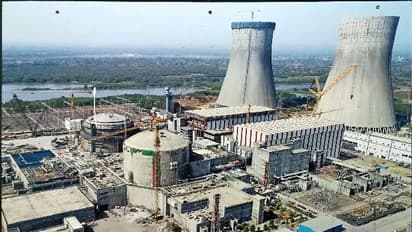India seeks $26 billion private investment in nuclear energy sector, targets carbon reduction: Report

Synopsis
India reportedly plans to attract $26 billion in private investment for its nuclear energy sector, marking a significant shift and aiming to increase non-carbon-emitting electricity generation, with talks underway with major firms like Reliance Industries and Tata Power.
In a significant shift, India is reportedly set to welcome private companies to invest approximately $26 billion in its nuclear energy sector, aiming to boost electricity generation from non-carbon-emitting sources, according to a Reuters report. This marks the inaugural effort by New Delhi to attract private investment in nuclear power, which currently contributes less than 2% to India's overall electricity generation but is crucial for reducing carbon emissions.
The infusion of funds is reportedly expected to facilitate India in reaching its goal of having 50% of its installed electric generation capacity sourced from non-fossil fuels by 2030, an increase from the current 42%.
The government is currently in discussions with at least five private firms, including Reliance Industries, Tata Power, Adani Power, and Vedanta Ltd, to invest approximately 440 billion rupees ($5.30 billion) each, according to the report.
Over the past year, the federal Department of Atomic Energy and the state-run Nuclear Power Corp of India Ltd (NPCIL) have reportedly engaged in multiple rounds of talks with these private companies regarding the investment plan.
The report quoting sources stated that with this investment, the government aims to establish 11,000 megawatts (MW) of new nuclear power generation capacity by 2040.
NPCIL currently possesses and operates India's existing fleet of nuclear power plants, totaling a capacity of 7,500 MW, and has already earmarked investments for an additional 1,300 MW.
According to the Reuters report, private companies will be responsible for investing in the nuclear plants, acquiring land and water, and undertaking construction activities in areas outside the reactor complex of the plants. However, the rights to construct and manage the stations, as well as their fuel management, will remain with NPCIL, as permitted by law.
The private entities are anticipated to generate revenue from the sale of electricity generated by the power plants, while NPCIL will oversee project operations for a fee, as outlined by the report.
"This hybrid model of nuclear power project development is an innovative solution to accelerate the nuclear capacity," Charudatta Palekar, an independent power sector consultant who formerly worked for PwC, told the news agency.
The report quoting sources stated that the plan will not necessitate any amendments to India's Atomic Energy Act of 1962 but will require final approval from the Department of Atomic Energy.
Indian legislation prohibits private companies from establishing nuclear power plants but permits them to provide components, equipment, and enter into construction contracts for activities outside the reactor areas.
Despite India's failure to meet its nuclear power capacity addition goals for years, primarily due to challenges in procuring nuclear fuel supplies, a breakthrough came in 2010 when India secured a deal with the United States for reprocessed nuclear fuel supplies.
India's stringent nuclear compensation laws have posed obstacles in negotiations with foreign power plant builders such as General Electric and Westinghouse. As a result, the country has postponed its target to add 2,000 MW of nuclear power from 2020 to 2030.
Stay updated with all the latest Business News, including market trends, Share Market News, stock updates, taxation, IPOs, banking, finance, real estate, savings, and investments. Track daily Gold Price changes, updates on DA Hike, and the latest developments on the 8th Pay Commission. Get in-depth analysis, expert opinions, and real-time updates to make informed financial decisions. Download the Asianet News Official App from the Android Play Store and iPhone App Store to stay ahead in business.